儒家文化英文ppt
合集下载
儒家文化英文介绍
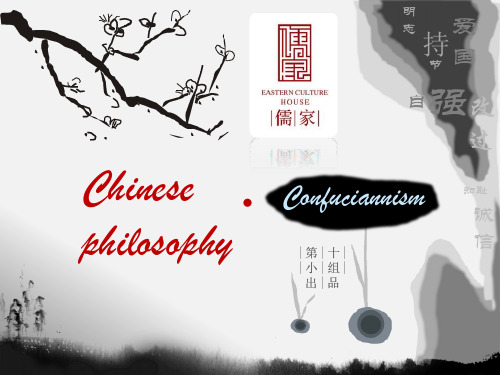
Classic of Poetry
儒
家
Core Ideology of Confucian: Ren(仁):benevolence to others—the root Yi (义):righteousness by justice—the trunk Li (礼):moral ways of conduct—the branches Zhi (智):wisdom—the flower Xin (信):trustworthiness—the fruit
Confucian classics
儒
家
Four Books
“The Great Learning”: Confucian thought of cultivating one`s morality,administer ing a country and making world peaceful
XunZi is another Confucian philosopher who lived during the Warring States period. He believed man`s inborn tendencies need to be curbed (v.限制) through education and ritual .
家
传统 文化
Chinese people are greatly influenced by Confucianism . The attitude toward living a life of the _g_ol_d_e_n_ mean can be found not only from ancient Chinese scholars,but also from almost everyone , the educated and u_n_e_d_u_c_a_t_e_d of modern China . There is a saying that whether you accept it or not, so long as you are a Chinese ,you can trace the influence__C_o_n_fu_c_i_a_n_is_m__ of in you.
最新孔子英文介绍PPt说课材料

言必信,行必果。
Keep what you say and carry out what you do.
Confucius’s sayings:
yǒupéng zì yuǎnfāng lái,búyì yuè hū.
有朋自远方来,不亦乐乎。
Is it not delightful to have friends coming from distant quarters?
Confucius’s sayings:
sìhǎi zhīnèi jiē xiōngdì. 四海之内皆兄弟也; All Men Are Brothers.
Confucius’s sayings:
xìng xiāng jìn,xí xiāng yuǎn yě.
性相近也,习相远也。
By nature, men are nearly alike; by practice, they get to be wide apart
此课件下载可自行编辑修改,仅供参考! 感谢您的支持,我们努力做得更好! 谢谢!
Confucius’s sayings言必信,行必果。
Keep what you say and carry out what you do.
Confucius’s sayings:
rén wú yuǎnlǜ,bìyǒu jìnyōu. 人无远虑,必有近忧。
孔子英文介绍PPt
One of the most famous people in ancient China ——
• This Chinese man was a well-known leader in philosophy and he also made many wise phrases and theories about the law, life,
Keep what you say and carry out what you do.
Confucius’s sayings:
yǒupéng zì yuǎnfāng lái,búyì yuè hū.
有朋自远方来,不亦乐乎。
Is it not delightful to have friends coming from distant quarters?
Confucius’s sayings:
sìhǎi zhīnèi jiē xiōngdì. 四海之内皆兄弟也; All Men Are Brothers.
Confucius’s sayings:
xìng xiāng jìn,xí xiāng yuǎn yě.
性相近也,习相远也。
By nature, men are nearly alike; by practice, they get to be wide apart
此课件下载可自行编辑修改,仅供参考! 感谢您的支持,我们努力做得更好! 谢谢!
Confucius’s sayings言必信,行必果。
Keep what you say and carry out what you do.
Confucius’s sayings:
rén wú yuǎnlǜ,bìyǒu jìnyōu. 人无远虑,必有近忧。
孔子英文介绍PPt
One of the most famous people in ancient China ——
• This Chinese man was a well-known leader in philosophy and he also made many wise phrases and theories about the law, life,
中国传统文化-英文PPT

Jiuzhaigou
In the north of Sichuan, a province in south western China.
It is known for its many multi-level waterfalls and colorful
The Potala Palace
With a long history Mysterious charm
admire
Mr.Wang(王羲之)
Confucianism
Confucianism was originally the philosophy of Confucius who stressed the maintenance of a stable system of inter-personal relationships at different levels of society.
水煮鱼 Boiled fish
回锅肉 twice-- cooked pork
8
Beijing
豆汁 Mung Bean Milk
爆肚 Quick-Fried Tripe
驴打滚 Fried Chop Rice Cake
BACK
Chinese Tea Culture
Referring to Chinese tea, it can be traced back to the ancient times, and it was flourished in the Tang dynasty and the Song dynasty. China is the homeland of tea, and tea have become the national drink.
孔子与儒家(英文介绍) ppt课件
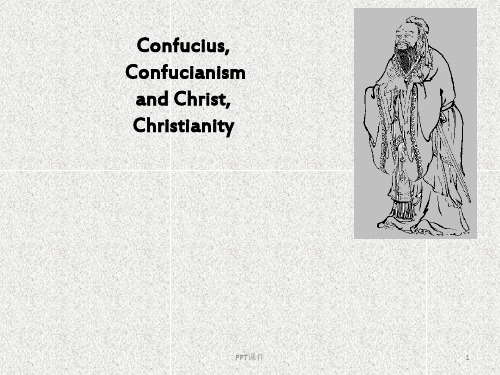
• Collective > Individual • Humans are good, but
we stray – Education and self-
discipline
PPT课件
6
PPT课件
7
Confucianism as a religion
• Religion = community of people who share beliefs, cultural practices, worship a deity/deities
• “something done with great attention to detail”
– Confucian philosophy of self discipline
PPT课件
8
Confucianism as a religion
• Confucius was not a god or a prophet
PPT课件
4
Confucianism as a system of ethics
• Moral conduct is the basis of social harmony • Emphasis on self discipline and education • Obligation to family
simply because it ought to be done, not for personal gain or profit.
Basically… A person does all action for the sake of Yi because they
Basically…
A person does all actions for the sake of Jen because the respect for humanity implies the right
we stray – Education and self-
discipline
PPT课件
6
PPT课件
7
Confucianism as a religion
• Religion = community of people who share beliefs, cultural practices, worship a deity/deities
• “something done with great attention to detail”
– Confucian philosophy of self discipline
PPT课件
8
Confucianism as a religion
• Confucius was not a god or a prophet
PPT课件
4
Confucianism as a system of ethics
• Moral conduct is the basis of social harmony • Emphasis on self discipline and education • Obligation to family
simply because it ought to be done, not for personal gain or profit.
Basically… A person does all action for the sake of Yi because they
Basically…
A person does all actions for the sake of Jen because the respect for humanity implies the right
孔子英文介绍ppt课件
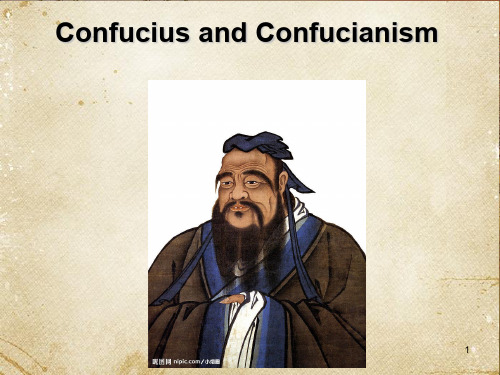
• Confucius is famous for his philosophy because he made many wise sayings in ancient China that helped many people learn about nature, the world, and the human behavior.
言必信,行必果。
Keep what you say and carry out what you do.
6
Confucius’s sayings:
yǒupéng zì yuǎnfāng lái,búyì yuè hū.
有朋自远方来,不亦乐乎。
Is it not delightful to have friends coming from distant quarters?
2
Confucius(孔子 kǒngzi)
Thinker 思想家 Educator 教育家 Statesman 政治家 Philosopher 哲学家 Founder of the Confucian school and
Confucianism 儒家学派创始人 Symbol of Chinese culture中国文化的象征
3
Confucian temple, is sacrificial offering Kong Zi and its Madame Qi Guanshi and 72 talented people's place.
The Confucian temple beginning constructs in 478 B.C., the second year which Kong Zi died constructs the temple
言必信,行必果。
Keep what you say and carry out what you do.
6
Confucius’s sayings:
yǒupéng zì yuǎnfāng lái,búyì yuè hū.
有朋自远方来,不亦乐乎。
Is it not delightful to have friends coming from distant quarters?
2
Confucius(孔子 kǒngzi)
Thinker 思想家 Educator 教育家 Statesman 政治家 Philosopher 哲学家 Founder of the Confucian school and
Confucianism 儒家学派创始人 Symbol of Chinese culture中国文化的象征
3
Confucian temple, is sacrificial offering Kong Zi and its Madame Qi Guanshi and 72 talented people's place.
The Confucian temple beginning constructs in 478 B.C., the second year which Kong Zi died constructs the temple
孔子与儒家(英文介绍)(课堂PPT)
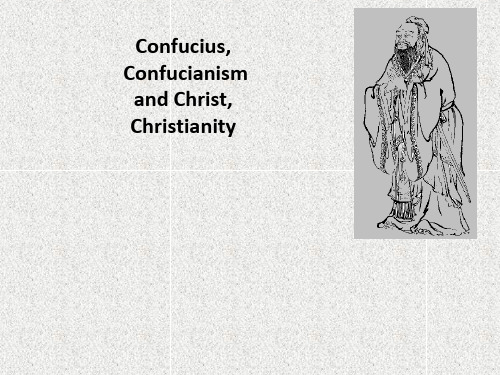
Confucius, Confucianism and Christ, Christianity
Confucius: Latinized spelling
Chinese name: • Kong Fuzi 孔夫子 • (Master Kong) • 551-479 BC titles: The First Holy One, First Teacher, Teacher of the Ten
• Collective > Individual • Humans are good, but
we stray – Education and self-
discipline
4/4/2020
4/4/2020
Jamie Buehler
Confucianism as a religion
• Religion = community of people who share beliefs, cultural practices, worship a deity/deities
• “something done with great attention to detail”
– Confucian philosophy of self discipline
4/4/2020
Confucianism as a religion
• Confucius was not a god or a prophet
• He did not create these ideas, but merely restored them
“As to being a Divine Sage or even a Good Man, far be it from me to make any such claim.”
Confucius: Latinized spelling
Chinese name: • Kong Fuzi 孔夫子 • (Master Kong) • 551-479 BC titles: The First Holy One, First Teacher, Teacher of the Ten
• Collective > Individual • Humans are good, but
we stray – Education and self-
discipline
4/4/2020
4/4/2020
Jamie Buehler
Confucianism as a religion
• Religion = community of people who share beliefs, cultural practices, worship a deity/deities
• “something done with great attention to detail”
– Confucian philosophy of self discipline
4/4/2020
Confucianism as a religion
• Confucius was not a god or a prophet
• He did not create these ideas, but merely restored them
“As to being a Divine Sage or even a Good Man, far be it from me to make any such claim.”
中国传统文化 英文版ppt课件

15
There are four main schools(流派) and some sorts of Chinese martial arts.
•Emei 峨眉
•Wudang 武当
•Shaolin 少林
Kongtong 崆峒
16
• Wing Chun • 咏春拳
17
• Tai Chi
• 太极拳
6
Classification
The most famous Beijing Opera
It is known as Chinese national essence. It flourished in the 1940s,and it is over 200 years old. I'd like to recommend a movie, Farewell My Concubine(霸王别 姬).
18
• Drunken Master • 醉拳
19
• Mantis Boxing
• 螳螂拳 20
• Jeet kune do • 截拳道
21
Thanks
22
breifintroductionhanfu汉服embroidery刺绣calligraphy书法kungfu中国功夫chinesetraditionalopera中国传统戏曲symbolschinesetraditionalcultureconfucianculture儒家文化chineseclassicalgarden中国古典园林papercut剪纸chineseknot中国结chinesetraditionalinstrument中国传统乐器ourcountrypeoplecomingfromdifferentregionsgivedifferentways
There are four main schools(流派) and some sorts of Chinese martial arts.
•Emei 峨眉
•Wudang 武当
•Shaolin 少林
Kongtong 崆峒
16
• Wing Chun • 咏春拳
17
• Tai Chi
• 太极拳
6
Classification
The most famous Beijing Opera
It is known as Chinese national essence. It flourished in the 1940s,and it is over 200 years old. I'd like to recommend a movie, Farewell My Concubine(霸王别 姬).
18
• Drunken Master • 醉拳
19
• Mantis Boxing
• 螳螂拳 20
• Jeet kune do • 截拳道
21
Thanks
22
breifintroductionhanfu汉服embroidery刺绣calligraphy书法kungfu中国功夫chinesetraditionalopera中国传统戏曲symbolschinesetraditionalcultureconfucianculture儒家文化chineseclassicalgarden中国古典园林papercut剪纸chineseknot中国结chinesetraditionalinstrument中国传统乐器ourcountrypeoplecomingfromdifferentregionsgivedifferentways
最新儒家思想英文介绍
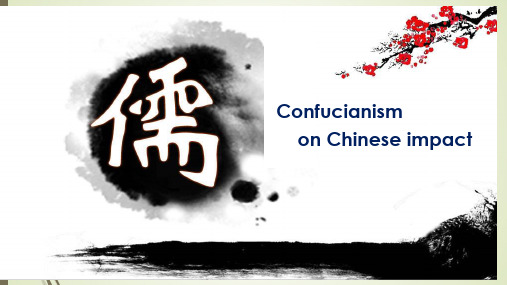
Confucianism on Chinese impact
What you do not want done to yourself, do not do to others. 己所不欲,勿施于人。 Learning without thought is labor lost; thought without learning is perilous. 学而不思则罔,思而不学则殆。 If a man take no thought about what d sorrow near at hand. 人无远虑,必有近忧。 Keep what you say and carry out what you do.
A great thinker, political figure, educator ,philosopher Symbol of Chinese culture. The founder of Confucianism Advocated ―Benevolence‖、‖ righteousness‖、‖ moral‖、 ‖ Wisdom ‖、‖trustworthiness‖
2.Introdunction of Confuciansim
A school of thought represented by Confucius and Mencius. A set of moral and social values designed to bring ways of man and government in harmony with each other and with the universe.
(312–230 BC)
(179–104 BC)
Dong zhongshu ,who is a Han Dynasty Chinese scholar, promoted Confucianism as the official ideology of the Chinese imperial state. He advocated ―oust others doctrines,the overwhelming Confucianism‖(罢黜百家,独尊儒术)
What you do not want done to yourself, do not do to others. 己所不欲,勿施于人。 Learning without thought is labor lost; thought without learning is perilous. 学而不思则罔,思而不学则殆。 If a man take no thought about what d sorrow near at hand. 人无远虑,必有近忧。 Keep what you say and carry out what you do.
A great thinker, political figure, educator ,philosopher Symbol of Chinese culture. The founder of Confucianism Advocated ―Benevolence‖、‖ righteousness‖、‖ moral‖、 ‖ Wisdom ‖、‖trustworthiness‖
2.Introdunction of Confuciansim
A school of thought represented by Confucius and Mencius. A set of moral and social values designed to bring ways of man and government in harmony with each other and with the universe.
(312–230 BC)
(179–104 BC)
Dong zhongshu ,who is a Han Dynasty Chinese scholar, promoted Confucianism as the official ideology of the Chinese imperial state. He advocated ―oust others doctrines,the overwhelming Confucianism‖(罢黜百家,独尊儒术)
儒家经典英文版

?thebookofmusic五经十三经?诗经?尚书?周礼?礼记?仪礼?易经?春秋左传?春秋公羊传?春秋榖梁传?论语?孟子?孝经?尔雅探索宇宙的奥秘thebookofchangesthebookofchanges?zhouyiorthebookofchangesiscomposedofyijingorpresentdaybookofchangesandyizhuanorremarksonthetrigrams
卦象:地 人物:老母、孕妇、妻 子、众人 天气:阴云、雾气 身体:腹部、脾胃 方位:西南 数字:八 五行:土 场所:田野、平地 其他:柔顺、方形
Famous sayings
天行健,君子以自强不息; 地势坤,君子以厚德载物.
The Book of Changes
聂政刺韩王
在东汉蔡邕的《琴操》里,这次刺杀变成了一则民 间故事。在这则故事里,聂政杀的不是韩相,而是 韩王。聂政也不是为严仲子而行刺,而是为父报仇。 原来聂政的父亲为韩王铸剑,由于不能及时交付而 被杀。于是聂政成了遗腹子。长大后聂政在山中遇 到了仙人,学会了鼓琴的绝艺。聂政还掌握了异容 术,变得无人认识自己。一天聂政在闹市鼓琴, “观者成行,马牛止听”。韩王听说后立即召见了 聂政,命聂政当众鼓琴。这时聂政取出琴中藏匿的 剑,一举刺杀了韩王,为父亲报了仇。后来伏在聂 政尸体上恸哭不止的不是聂荣,而是聂政的母亲。 这个故事被蔡邕取名为“聂政刺韩王”。
The Book of Poetry
Ya, composed of 105 odes, can be divided into major festal songs and minor festal songs. They are said to be regular music, traditionally sung at court festivities, ceremonies, banquets and other solemn occasions. Song or hymns are the dance music sung at sacrifices of ancestral spirits of the royal house. They, 40 songs in all, are again grouped into the odes of the Zhou Dynasty, the Shang Dynasty and the Lu State respectively.
卦象:地 人物:老母、孕妇、妻 子、众人 天气:阴云、雾气 身体:腹部、脾胃 方位:西南 数字:八 五行:土 场所:田野、平地 其他:柔顺、方形
Famous sayings
天行健,君子以自强不息; 地势坤,君子以厚德载物.
The Book of Changes
聂政刺韩王
在东汉蔡邕的《琴操》里,这次刺杀变成了一则民 间故事。在这则故事里,聂政杀的不是韩相,而是 韩王。聂政也不是为严仲子而行刺,而是为父报仇。 原来聂政的父亲为韩王铸剑,由于不能及时交付而 被杀。于是聂政成了遗腹子。长大后聂政在山中遇 到了仙人,学会了鼓琴的绝艺。聂政还掌握了异容 术,变得无人认识自己。一天聂政在闹市鼓琴, “观者成行,马牛止听”。韩王听说后立即召见了 聂政,命聂政当众鼓琴。这时聂政取出琴中藏匿的 剑,一举刺杀了韩王,为父亲报了仇。后来伏在聂 政尸体上恸哭不止的不是聂荣,而是聂政的母亲。 这个故事被蔡邕取名为“聂政刺韩王”。
The Book of Poetry
Ya, composed of 105 odes, can be divided into major festal songs and minor festal songs. They are said to be regular music, traditionally sung at court festivities, ceremonies, banquets and other solemn occasions. Song or hymns are the dance music sung at sacrifices of ancestral spirits of the royal house. They, 40 songs in all, are again grouped into the odes of the Zhou Dynasty, the Shang Dynasty and the Lu State respectively.
中国传统文化英文PPT课件

Frog 盘扣 Mandarin collar 立领 Lapel / front of a
garment襟 Openings 衩 Embroidery 刺绣
BACK
Chinese Food
Chinese Rice Dumplings(粽子) The Moon Cake(月饼)
Traditional holiday meals are different from everyda y meals in terms of quantity and quality. In addition,
Cheongsam
qípáo
The Qi Pao, also known as mandarin gown, is a bodyhugging one-piece dress,
it is one of the most typical, traditional
1920s
1930s
1940s
The structure
some foods with a long history and symbolic
significance are indispensable on these occasions. For example, on the Dragon Boat Festival, a day set
aside in memory of the ancient poet Qu Yuan, people will hold dragon boat races and eat zongzi, a kind o f
glutinous rice dumplings wrapped in bamboo leaves.
The moon cake
garment襟 Openings 衩 Embroidery 刺绣
BACK
Chinese Food
Chinese Rice Dumplings(粽子) The Moon Cake(月饼)
Traditional holiday meals are different from everyda y meals in terms of quantity and quality. In addition,
Cheongsam
qípáo
The Qi Pao, also known as mandarin gown, is a bodyhugging one-piece dress,
it is one of the most typical, traditional
1920s
1930s
1940s
The structure
some foods with a long history and symbolic
significance are indispensable on these occasions. For example, on the Dragon Boat Festival, a day set
aside in memory of the ancient poet Qu Yuan, people will hold dragon boat races and eat zongzi, a kind o f
glutinous rice dumplings wrapped in bamboo leaves.
The moon cake
文化英文ppt

文第
六
化组
ቤተ መጻሕፍቲ ባይዱ
China
C
O N
目
T
E录
N
T
1st· C u l t u r e
文
化
2nd· Civilization
文
明
3rd·C o m m u n i c a t i o n
交
流
4th·C r o s s - c u l t u r a l communication 跨文化交流
壹文
化
culture
Means of communication
Face to face
Network communication
Ideological communicication
Definition
It refers to the communication between
壹
native speakers and non-native speakers, and it also refers to the communication
ACI international registered Intercultural Communication Manager
ACI美国认证协会推出的“国际注册跨文化交际管理师证书” 是被全球157个国家认可的,全球通用。ACI国际注册跨文 化交际管理师证书获得了美国联邦政府的公证,具有国际 权威性。在中国,ACI是获得国家人社部认证认可的国际认 证机构,人社部职业技能鉴定中心OSTA网站对ACI进行机构 公示。凭借ACI证书将有机会参加在美国举办的行业会议、 论坛、商务考察、培训等相关活动,可申请进入中国专业 人才库,在国家官网查询,并作为高级专业人才储备,存 档供单位人事部门查询,是岗位聘用、任职、加薪和职务 晋升的重要依据。
六
化组
ቤተ መጻሕፍቲ ባይዱ
China
C
O N
目
T
E录
N
T
1st· C u l t u r e
文
化
2nd· Civilization
文
明
3rd·C o m m u n i c a t i o n
交
流
4th·C r o s s - c u l t u r a l communication 跨文化交流
壹文
化
culture
Means of communication
Face to face
Network communication
Ideological communicication
Definition
It refers to the communication between
壹
native speakers and non-native speakers, and it also refers to the communication
ACI international registered Intercultural Communication Manager
ACI美国认证协会推出的“国际注册跨文化交际管理师证书” 是被全球157个国家认可的,全球通用。ACI国际注册跨文 化交际管理师证书获得了美国联邦政府的公证,具有国际 权威性。在中国,ACI是获得国家人社部认证认可的国际认 证机构,人社部职业技能鉴定中心OSTA网站对ACI进行机构 公示。凭借ACI证书将有机会参加在美国举办的行业会议、 论坛、商务考察、培训等相关活动,可申请进入中国专业 人才库,在国家官网查询,并作为高级专业人才储备,存 档供单位人事部门查询,是岗位聘用、任职、加薪和职务 晋升的重要依据。
儒家文化

•
务实,奋斗,成就,成功。2020年11月6日星 期五5时29分4秒Friday, November 06, 2020
•
相信相信得力量,创造应创造的事情 。20.11.62020年11月6日星期 五5时29分4秒 20.11.6
谢谢大家!
伏念:秦时明月中儒家掌门人,十大 名剑排名第 三的太阿剑的剑主 ,武 功高强。
儒
classic works of Confucianist
classic works of Confucianist
The analects of Confucius
classic works of Confucianist
classic works of Confucianist
classic works of Confucianist
爱人不亲,反其仁;治人不 治,反其智;礼人不答,反 其敬——行有不得者皆反求 诸己,其身正而天下归之。
classic works of Confucianist
儒家思想
Learning without thought is labor lost; thought without learning is perilous. 学而不思则罔,思而不学则殆
儒家文化及其价值观已经成为中华民族精 神的重要因素,那些关于做人、处事和立国的 名言早已深入人心,并在潜移默化中传布到社 会生活的各个角落。
Undoubtedly, the dross(渣滓) is there, but we can not give up, where the essence. We went into Confucianism, consider it for each individual, the future impact on our China.
中国文化概况哲学和宗教 英文版_图文

substance, and the standard of all things, to which all of them must conform
• Based on the work of Daodejing, Taoism promotes the belief that a person should live a simple life
mainly discusses the relationship between human beings, between man and nature, and between man and society, as well as the nature of human beings
two main schools: the School of Principle (理学) the School of Mind (心学)
4
Lead-in Activity
Watch and & Think
Watch the video clip and discuss: Do you think philosophy and religion are important in our life? How many kinds of philosophical thoughts and religious
“words versus ideas”
“fundamentals versus practice”
“ethics versus nature”, etc.
17
The Development of Chinese Philosophy
Orthodox Philosophy During the Han Dynasty ( 两汉经学)
• Based on the work of Daodejing, Taoism promotes the belief that a person should live a simple life
mainly discusses the relationship between human beings, between man and nature, and between man and society, as well as the nature of human beings
two main schools: the School of Principle (理学) the School of Mind (心学)
4
Lead-in Activity
Watch and & Think
Watch the video clip and discuss: Do you think philosophy and religion are important in our life? How many kinds of philosophical thoughts and religious
“words versus ideas”
“fundamentals versus practice”
“ethics versus nature”, etc.
17
The Development of Chinese Philosophy
Orthodox Philosophy During the Han Dynasty ( 两汉经学)
儒家思想英语PPT详细版

Confucianism Confucian thinking Confucian ideology
3.Some of the phrases
The evolution of the Confucianism thought 儒家思想演变 Confucianism theory 儒家思想学说 Introduction to Confucian thoughts 儒家思想概论 Confucian speciality 儒家思想特质 The influence of confucianism ; confucianism affected 儒家思想影响 Inheritance of Confucianism 传承儒家思想
Confucian culture is an important part of Chinese traditional culture.
The ideological contents of Confucian culture includes a lot, the core content is "benevolence", etc .
演示课件
朱熹 1130—1200
Neo-Confucianism(理 学) marked new development peak of Confucianism
演示课件
The Four Books 1. The Analects of Confucius 2. The Doctrine of Mean 3. The Great Learning 4. Mencius The Five Classics 1.The Book of Songs 2.The Book of History 3.The Book of Changes 4.The Bo演o示k 课of件Rites 5.The Spring and Autumn Annals
3.Some of the phrases
The evolution of the Confucianism thought 儒家思想演变 Confucianism theory 儒家思想学说 Introduction to Confucian thoughts 儒家思想概论 Confucian speciality 儒家思想特质 The influence of confucianism ; confucianism affected 儒家思想影响 Inheritance of Confucianism 传承儒家思想
Confucian culture is an important part of Chinese traditional culture.
The ideological contents of Confucian culture includes a lot, the core content is "benevolence", etc .
演示课件
朱熹 1130—1200
Neo-Confucianism(理 学) marked new development peak of Confucianism
演示课件
The Four Books 1. The Analects of Confucius 2. The Doctrine of Mean 3. The Great Learning 4. Mencius The Five Classics 1.The Book of Songs 2.The Book of History 3.The Book of Changes 4.The Bo演o示k 课of件Rites 5.The Spring and Autumn Annals
中国传统文化中的儒家孝道 英文

Filial piety, like the constant law of heaven and the generating power of earth is the criterion of human conduct. (夫孝,天之经也,地之义也,民之行 也。)
Zeng Zi(曾子)
There are three kinds of filial piety: first respect one’s parents; second, avoid bringing humiliation to one’s parents; third, support one’s parents. (孝有三,大孝尊亲其次弗 辱,其下能养。)
6.Ending.The viewpoint "point out:" the son, is also close to its respect, in a caused the joy, the disease is caused the loss of sorrow, is the ",offering is severe, causing it to the right, and then five for can kiss ".The Confucian doctrine of the funeral of filial piety see very heavy, when at the funeral to do all kinds of etiquette.
Confucius(孔子)
The Book of Filial Piety That is filial piety, which is the very foundation of all virtues, and from which all enlightenments for the common people are engendered. (夫孝,德之本也,教之所由生也。)
Zeng Zi(曾子)
There are three kinds of filial piety: first respect one’s parents; second, avoid bringing humiliation to one’s parents; third, support one’s parents. (孝有三,大孝尊亲其次弗 辱,其下能养。)
6.Ending.The viewpoint "point out:" the son, is also close to its respect, in a caused the joy, the disease is caused the loss of sorrow, is the ",offering is severe, causing it to the right, and then five for can kiss ".The Confucian doctrine of the funeral of filial piety see very heavy, when at the funeral to do all kinds of etiquette.
Confucius(孔子)
The Book of Filial Piety That is filial piety, which is the very foundation of all virtues, and from which all enlightenments for the common people are engendered. (夫孝,德之本也,教之所由生也。)
- 1、下载文档前请自行甄别文档内容的完整性,平台不提供额外的编辑、内容补充、找答案等附加服务。
- 2、"仅部分预览"的文档,不可在线预览部分如存在完整性等问题,可反馈申请退款(可完整预览的文档不适用该条件!)。
- 3、如文档侵犯您的权益,请联系客服反馈,我们会尽快为您处理(人工客服工作时间:9:00-18:30)。
孟子篇:
• 孟子,与孔子并称“孔孟”,战国时期伟大的思想家,儒家的主要代表之一,是儒家 的理想主义流派。 • Meng Zi, and Kong Zi, "Kong Meng", a great thinker in the Warring States period, one of the main representatives of Confucianism, Confucianism is the ideal school. • 孟子发展了孔子“仁”的思想,提出了“民为贵、社稷次之、君为轻”的民本思想, 并提出了人性本善。 • Mencius developed Kong Zi thought of "benevolence", put forward "people are expensive, followed by state, king of light" thought of the people, and put forward the goodness of human nature. • 后世尊称为“亚圣”,受儒教祭祀。其弟子及再传弟子将孟子的言行记录成《孟子》 一书,属语录体散文集,是孟子的言论汇编,由孟子及其弟子万章共同编写完成。 • Later known as the "sage", by the Confucian ritual. His disciples and his disciples will be Meng Zi's words and deeds recorded into the book of Meng Zi, is a collection of quotations, is Meng Zi's speech, written by Meng Zi and his disciples together to complete.
Confucian culture 儒家文 化
Hello everyone, 大家好, I will make a brief introduction of Confucian culture is today. 我今天给大家简单介绍的是儒 家文化。
Confucian culture guided by the Confucianism culture of schools. Advocating CunYang kin ethics, secular his undertaking, cultivate one's morality, moral reason, its central idea is filial piety, and, sincerity, truthfulness, courtesy, righteousness, inexpensive, shame, its core is "benevolence". 儒家文化以儒家思想为指导的文化流派。 倡导血 亲人伦、现世事功、修身存养、道德理性,其中心 思想是孝、悌、忠、信、礼、义、廉、耻,其核心 是“仁”。
今天的演讲到此结束 Today's speech to this end
谢谢观看 Thanks for watching
孔子篇:
孔子,生于春秋时期。 中国著名的大思想家、大教育家、政治家。孔子开创 了私人讲学的风气,是儒家学派的创始人。 Kong Zi, was born in the spring and autumn period. Famous Chinese thinker, educator and politician. Kong Zi created a private teaching atmosphere, is the founder of confucianism. 孔子曾受业于老子,带领部分弟子周游列国十四年,相传他有弟子三千,其 中七十二贤人。孔子去世后,其弟子及其再传弟子把孔子及其弟子的言行语 录和思想记录下来,整理编成儒家经典《论语》。 Kong Zi has led the industry in the Lao Tzu, part of his disciples to travel around the world for fourteen years, according to legend he has three thousand disciples, one of the seventy-two wise men. After Kong Zi's death, his disciples and his disciples took the words and deeds of Kong Zi and his disciples.
